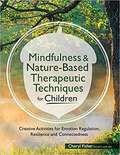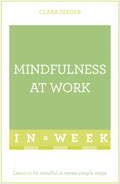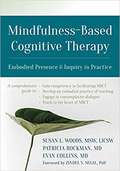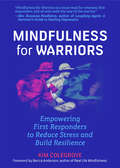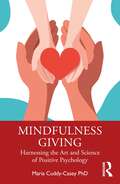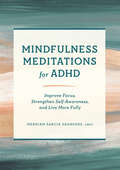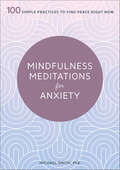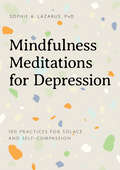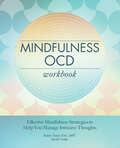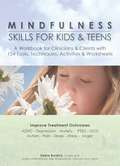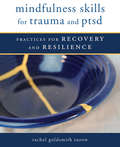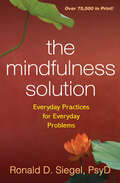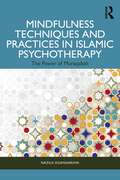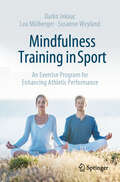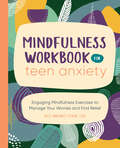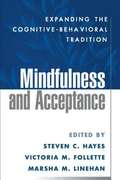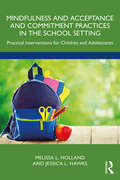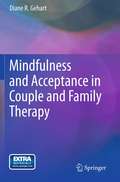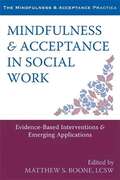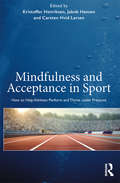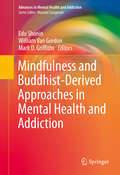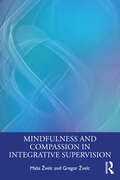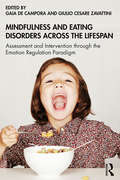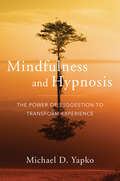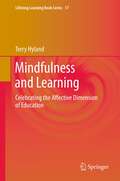- Table View
- List View
Mindfulness & Nature-Based Therapeutic Techniques for Children: Creative Activities for Emotion Regulation, Resilience and Connectedness
by Cheryl FisherWhether you’re in the therapy office, a classroom, in the city, or the countryside, using nature-based activities with children is always possible, and incredibly therapeutic. By integrating these activities with mindfulness, therapists and educators can harness the power of both treatments, and help children become calm, alert and happier human beings. Mindfulness and Nature-Based Therapeutic Techniques for Children provides evidence-based, practical, accessible and FUN activities to promote: - Self-regulation - Cognitive and emotional development - Physical development - Sensory regulation - Play and creativity - Empathy - Resilience to cope with trauma and grief. Dozens of activities for children of all ages!
Mindfulness At Work In A Week: Learn To Be Mindful In Seven Simple Steps
by Clara SeegerYour fastest route to experiencing the benefits of mindfulnessYou are just seven steps away from experiencing the benefits of mindfulness at work for yourself. Imagine being able to reduce stress while achieving greater levels of focus and productivity. Now you can. Mindfulness is more than a buzzword. It is a vital skill to help you survive and get ahead in your career. Executive coach and business trainer Dr Seeger has been practising and teaching mindfulness since before it was fashionable, and in this short, accessible book she shares a lifetime of hard-earned wisdom and practical advice.Whether you choose to read it in a week or in a single sitting, Mindfulness at Work In A Week is your fastest route to success:- Sunday: Learn to focus your attention and overcome the multi-tasking myth- Monday: Use mindfulness-based stress reduction (MBSR) to prevent and overcome stress- Tuesday: Discover how mindfulness can optimise your productivity- Wednesday: Use mindfulness to overcome the brain's negativity bias and make the workplace happier for yourself and your colleagues- Thursday: Regulate your emotions and improve your self-control- Friday: Use mindfulness to create new mental maps which will promote insight and creativity- Saturday: Understand how using mindfulness can strengthen relationships with your team
Mindfulness Based Cognitive Therapy: Embodied Presence and Inquiry in Practice
by Patricia Rockman Evan Collins Susan Woods<p>Mindfulness-based cognitive therapy (MBCT) is a powerful, evidence-based treatment for depression and other mental health conditions. This groundbreaking professional book provides clinicians with the essential skills they need to deliver MBCT. <p>In this book, you’ll discover the foundations of teaching MBCT, guidance on embodied mindful presence (a focused awareness of experience in the moment), the contemplative dialogue known as inquiry, and other strategies for delivering group-based MBCT. You’ll also find scripts, access to audio material, and practice guidelines for you and your clients. Although focused on MBCT, this book can be referenced for use in other mindfulness-based programs. <p>In addition, you’ll gain the knowledge and confidence you need to effectively deliver MBCT and build the foundations of an embodied practice. The book starts with an overview of the MBCT program, before devoting chapters to the structure and skills required for developing competence and best practice. You’ll deepen your understanding and facility in the most challenging elements of MBCT: mindful embodied presence and inquiry. <p>You’ll also learn strategies for delivering this therapy to a group; troubleshooting tips; and a chapter on training, mentorship, and maintaining competence. Finally, you’ll find essential information including meditation scripts, tools, and other resources for delivering MBCT. <p>If you are looking to deepen your practice and ability to teach MBCT, this book—written by renowned MBCT clinicians—is an invaluable addition to your professional library.</p>
Mindfulness For Warriors: Empowering First Responders to Reduce Stress and Build Resilience
by Kim ColegroveA meditation expert shares tools for coping with the first responder way of life, and personal stories of overcoming trauma through mindfulness.First responders have the difficult job of running toward danger and putting other people’s lives ahead of their own. Kim Colegrove knows from personal experience that what they endure on the job can be deeply traumatic. After thirty years in law enforcement, her husband took his own life. This agonizing experience inspired Kim to help first responders develop the tools they need to handle the profound stress they face.In 2017, Kim founded The PauseFirst Project, Mindfulness for First Responders. Working with organizations across the country, she teaches techniques that help reduce stress, regulate emotion, and improve overall health and well-being. In Mindfulness for Warriors, she shares these techniques, as well as interviews with first responders and her own harrowing story of loss, recovery and fighting in her husband’s memory.
Mindfulness Giving: Harnessing the Art and Science of Positive Psychology
by Maria Cuddy-CaseyThis accessible book offers a unique, evidence-based perspective on the art and science of giving. It combines concepts from psychology, neuroscience and social science theory with stories from interviewees on their experiences as a giver and receiver.This book offers a holistic overview of the reciprocal aspects of giving, strategies for selecting a recipient of a gift in a never-ending sea of need, and a guide to developing one’s personal philosophy, boundary, and plan on giving. As people seek to reconnect and find meaning, this book offers a venue for exploration. Covering topics such as empowering children to give, the financial considerations of giving, compassion fatigue and how to set healthy boundaries, this book helps readers think about unique ways of giving. Through the use of action plans and worksheets, readers are encouraged to consider their own place in giving, empower themselves as a change agent, and recognize the positive social power and ripple effect of giving.Mindfulness Giving is valuable reading for students of positive psychology, social and health psychology, social work, and sociology, as well as professionals and coaches working in self-improvement and self-care.
Mindfulness Meditations for ADHD: Improve Focus, Strengthen Self-Awareness, and Live More Fully
by Merriam Sarcia Saunders LMFTLearn how to stay focused in the present moment through meditation Having ADHD can make meditation seem out of reach, but with the right tools, you can do it successfully and improve every area of your life. This book is full of mindfulness tools that will show you how to concentrate better, regulate your emotions, and practice self-compassion—so you can truly thrive. What sets this book apart from other ADHD books for adults: Mindfulness for adult ADHD—Learn what mindfulness and meditation are, and how they can strengthen your ability to focus your attention and respond to stress in healthy ways. Many ways to meditate—Develop the meditation practice that works for you with an engaging mix of shorter and longer exercises, sitting and walking meditations, morning and evening activities, and more. Beginner-friendly practices—Even if you've never meditated before, these mindfulness exercises include step-by-step instructions and expert tips to help ensure success. Bring more awareness to every moment with Mindfulness Meditations for ADHD.
Mindfulness Meditations for Anxiety: 100 Simple Practices to Find Peace Right Now
by Michael SmithEase your anxiety and calm your mind—any time of the day.Anxiety can throw off your day in a matter of minutes. Bring yourself back into balance with Mindfulness Meditations for Anxiety. These 100 practical meditations equip you to handle your physical and mental responses, no matter when fight-or-flight feelings strike.Reduce nervousness and fear with a variety of breathing and mindfulness exercises, designed by a licensed psychologist and meditation instructor. Develop the ability to target specific types of anxiety, whether they involve time of day, physical circumstances, or stressors like insomnia. Every exercise lists how long it takes; there are even chapters devoted to 5-minute and "do-anywhere" meditations—so you can find one for any occasion.Mindfulness Meditations for Anxiety includes:Meditation basics—Get started with an intro to mindfulness as an anxiety treatment, then follow the 6 meditations that lay the foundation for the book's exercises.100 simple practices—Helpful exercises include Traffic Light Meditation, Feel Your Body and Breathe, Get Back to Sleep, Quiet the Inner Critic, and more.Inspiring words—Contemplative quotes about consciousness, meditation, and mindfulness help expand your understanding and lift your spirits.Stop anxiety and start your day again with Mindfulness Meditations for Anxiety.
Mindfulness Meditations for Depression: 100 Practices for Solace and Self-Compassion
by Sophie A Lazarus PhDPractice self-compassion with 100 mindfulness meditations for depression The unhelpful patterns that fuel depression can become clearer, less intimidating, and easier to manage as we develop a mindfulness practice. Mindfulness Meditations for Depression is filled with gentle, step-by-step meditations to help bolster this awareness and break depression's hold on your life. Explore 100 accessible practices, structured around the seven principles of mindfulness: beginner's mind, non-judgment, acceptance, patience, trust, non-striving, and letting go. You'll learn how to use mindfulness techniques to better understand your mood, anxiety level, and overall well-being as you work through the challenges that life presents. While meditation is not a quick-fix for depression, the tools here can contribute to lasting relief. Mindfulness Meditations for Depression includes: Mindfulness for depression—Learn more about meditation and mindfulness, as well as the patterns of depression, including avoidance and rumination. Continuing self-care—Develop awareness around your emotions, thoughts, sensations, and behaviors so you can catch early warning signs of depression and employ mindful self-care tactics. Evidence-based methods—Discover meditations rooted in mindfulness-based cognitive therapy, which focuses on the development of mindfulness to cope with depressive patterns of thinking and prevent future relapse. Manage depression symptoms and find peace with Mindfulness Meditations for Depression.
Mindfulness OCD Workbook: Effective Mindfulness Strategies to Help You Manage Intrusive Thoughts
by Sarah Fader Robin Taylor Kirk LMFTManaging OCD with mindfulness—break the cycle of intrusive thoughts and live more peacefully People living with Obsessive-Compulsive Disorder (OCD) struggle with unwanted intrusive thoughts and urges that cause anxiety and distress. This mindfulness workbook teaches techniques to help you acknowledge those thoughts and relate to the physical symptoms of anxiety in a new way. With this interactive mindfulness workbook, you'll find exercises to help ground yourself in the present moment, plan mindfulness-based exposure to your triggers, and explore more productive language to describe how you feel. You'll learn how to disengage from distressing thoughts—which can help calm the urge to engage in compulsive behavior. This mindfulness workbook features: 7 Pillars of mindfulness—Every chapter focuses on one of the pillars of mindfulness: Beginner's Mind, Non-judgment, Acceptance, Patience, Trust, Non-striving, and Letting Go—with specific exercises for working on each one. 10-20 Minutes per day—These mindfulness workbook exercises only take a short time, so it's easy and practical to build them into your life. Encouragement and guidance—With supportive words, helpful advice, and space for personal reflection, you'll gradually move through techniques for a variety of intrusive thoughts. Find relief from the intrusive thoughts and urges of OCD with a simple and effective mindfulness workbook.
Mindfulness Skills for Kids & Teens: A Workbook for Clinicians & Clients with 154 Tools, Techniques, Activities & Worksheets
by Debra E BurdickFinally -- a comprehensive, practical and user-friendly mindfulness resource written specifically for children and adolescents. Best-selling mindfulness author Debra Burdick has blended the latest research and best practices to create this straight-forward guide for improving self-awareness, self-regulation skills, mental health, and social connectedness in kids and teens. This expertly crafted resource features a collection of more than 150 proven tools and techniques, presented in a simple, step-by-step skill building format. Perfect for mental health practitioners, teachers and all in the helping professions.
Mindfulness Skills for Trauma and PTSD
by Rachel Goldsmith TurowTrauma touches every life, but the way that we hold our pain makes a difference. Mindfulness Skills for Trauma and PTSD provides user-friendly descriptions of the many facets of traumatic stress alongside evidence-based strategies to manage trauma symptoms and build new strengths. This book is a valuable resource for trauma survivors, health professionals, researchers, mindfulness practitioners, and others seeking new pathways to recovery and resilience. It is normal to feel anxious or depressed after trauma, and to have upsetting thoughts and memories. Instead of fighting our feelings and blaming ourselves for what are actually common responses to trauma, mindfulness practices can help us tolerate and decrease distress, cultivate kindness towards ourselves and others, make wise choices, navigate attention, improve relationships, and relax--capacities that reduce trauma symptoms and advance our overall well-being. Practicing the small stuff can help us with the big stuff. As we learn to notice our breathing, walking, minor frustrations or daily activities with curiosity and care, we build inner resources to skillfully handle past trauma, as well as current and future challenges. Mindfulness practices can transform self-blame into self-respect and self-compassion. We can also match specific mindfulness skills to particular trauma symptoms. For example, "grounding" with the five senses can help us when we feel overwhelmed or spaced out, and loving-kindness meditation can alleviate self-criticism. With this book, you will explore scientifically supported mindfulness practices, plus "In their own words" sections that illustrate the skills with personal stories demonstrating how mindfulness practices have helped others recover from trauma. "Research highlight" sections showcase fascinating scientific studies that form the basis for the book's approaches. As we practice effective strategies to handle a full range of experiences, we can each find new sources of hope, connection, and peace.
Mindfulness Solution
by Ronald SiegelMindfulness offers a path to well-being and tools for coping with life's inevitable hurdles. And though mindfulness may sound exotic, you can cultivate it--and reap its proven benefits--without special training or lots of spare time. Trusted therapist and mindfulness expert Dr. Ronald Siegel shows exactly how in this inviting guide. You'll get effective strategies to use while driving to work, walking the dog, or washing the dishes, plus tips on creating a formal practice routine in as little as 20 minutes a day. Flexible, step-by-step action plans will help you become more focused and efficient in daily life; cope with difficult feelings, such as anger and sadness; deepen your connection to your spouse or partner; feel more rested and less stressed; curb unhealthy habits; find relief from anxiety and depression; and resolve stress-related pain, insomnia, and other physical problems. Free audio downloads of the meditation exercises are available at the author's website www.mindfulness-solution.com. Start living a more balanced life--today.
Mindfulness Techniques and Practices in Islamic Psychotherapy: The Power of Muraqabah
by Nazila IsgandarovaMindfulness Techniques and Practices in Islamic Psychotherapy is a guidefor Muslim spiritual care providers, psychologists, psychiatrists, psychotherapists,and others who use spiritual and religious concepts, values,and rituals as novel interventions to offer culturally appropriate mentalhealth services. Chapters lay out the practice of muraqabah as a strategyfor addressing mental and emotional disturbances such as depression,anxiety, personality disorders, attention‑deficit disorders, and more. Usinghermeneutical data, Mindfulness Techniques and Practices in IslamicPsychotherapy presents the processes and ethics of the muraqabah techniquein Islamic spiritual care and psychotherapy.
Mindfulness Training in Sport: An Exercise Program for Enhancing Athletic Performance
by Darko Jekauc Lea Mülberger Susanne WeylandThe cycle of emotions, like few other phenomena, can significantly influence our performance in sports. For this reason, many elite athletes turn to mindfulness training as a form of training for mental strength and emotion regulation. Prominent examples include Novak Djokovic (tennis), Phil Jackson (basketball), and Malaika Mihambo (track and fields).In recent years, the benefits of mindfulness-based training have also been discussed in the scientific community, and initial studies confirm the positive effects of its application. Overall, the conclusion can be drawn that mindfulness training works similarly to strength training: the ability to maintain concentration and regulate one's own emotions can be trained like a muscle.This book explains, through vivid practical examples, the significance of emotions in sports, the history of mindfulness in sports, and the mechanisms of mindfulness training for athletes. The focus lies on a scientifically evaluated mindfulness program for both recreational and elite athletes, which can be done individually or in a group. The eight units of the program contain practical exercises as well as information on the background and effects of each exercise. Become your own mental coach to sustainably enhance your athletic performance. The authorsProf. Dr. Darko Jekauc, a former tennis player of Germany’s Regional League, is familiar with the sudden onset of negative emotions that can cause doubt in a player and lead to a decline in their performance. He is currently the head of the department 'Health Education and Sports Psychology' at the Karlsruhe Institute of Technology (KIT) and conducts scientific research on emotions in sports. His research group, including Lea Mülberger and Susanne Weyland, particularly focuses on the role of mindfulness training and emotions.
Mindfulness Workbook for Teen Anxiety: Engaging Mindfulness Exercises to Manage Your Worries and Find Relief
by Sally Annjanece Stevens LCSWHelp your teen say goodbye to their worries with the power of mindfulnessBetween friends, relationships, and school, teens have a lot weighing on their minds. The Mindfulness Workbook for Teen Anxiety teaches teens the skills they need to handle their anxiety, cut down on stress, and live in the moment. They will discover how practicing mindfulness can help them overcome challenges and grow into confident, capable adults.This easy-to-use anxiety workbook for teens includes:Tools to stop anxiety—Teens will learn how being more mindful will help them manage their worries, appreciate the little things, and have a more positive outlook on life.Exercises that don't feel like homework—This workbook takes the stress out of learning stress-relief skills with an engaging mix of quizzes, prompts, meditations, and more.Stories of teen success—Your teen will be able to see how mindfulness practices have helped teens just like them overcome anxiety and be their best selves.Help the teen in your life develop the tools they need to overcome anxiety.
Mindfulness and Acceptance
by Victoria Follette Steven HayesThis volume examines the role of mindfulness principles and practices in a range of well-established cognitive and behavioral treatment approaches. Leading scientist-practitioners describe how their respective modalities incorporate such nontraditional themes as mindfulness, acceptance, values, spirituality, being in relationship, focusing on the present moment, and emotional deepening. Coverage includes acceptance and commitment therapy, dialectical behavior therapy, mindfulness-based cognitive therapy, integrative behavioral couple therapy, behavioral activation, and functional analytic psychotherapy. Contributors describe their clinical methods and goals, articulate their theoretical models, and examine similarities to and differences from other approaches.
Mindfulness and Acceptance and Commitment Practices in the School Setting: Practical Interventions for Children and Adolescents
by Melissa L. Holland Jessica L. HawksThis book offers specific, easy-to-implement mindfulness and acceptance and commitment therapy (ACT) tools for practitioners to use in schools at an individual, group, or classroom-wide level. With the increased focus on the emotional and behavioral health of children in the schools, there is a dearth of practical books that specifically address the use of ACT techniques in the school setting. Geared toward the practitioner and how they work with students, teachers, parents, and classrooms, this book introduces a contemporary approach to targeted intervention and discusses how these services can be provided using an MTSS model. These interventions have numerous benefits including increasing attention capacity, compassion, emotional regulation, and self-calming abilities, in addition to use as an intervention for anxiety, depression, and trauma related symptoms. Graduate students and practitioners who work with children and adolescents such as school psychologists, child and adolescent clinical psychologists, and school counselors will find this book to be a novel resource of interventions for children in grades K–12, along with tools to support parents and teachers.
Mindfulness and Acceptance in Couple and Family Therapy
by Diane R. GehartThis book reviews the research and philosophical foundations for using mindfulness, acceptance, and Buddhist psychology in couple and family therapy. It also provides a detailed and practical approach for putting these ideas into action in the therapy room, including a mindful approach to therapeutic relationships, case conceptualization, treatment planning, teaching meditation, and intervention.
Mindfulness and Acceptance in Social Work: Evidence-Based Interventions and Emerging Applications (Context Press Mindfulness And Acceptance Practica Ser.)
by Matthew S. BooneSocial work focuses on serving the most vulnerable members of society, and social workers must often address the contextual forces that contribute to human problems. Mindfulness and acceptance are powerful tools for this practice. By offering interventions like dialectical behavior therapy (DBT), mindfulness-based stress reduction (MBSR), and acceptance and commitment therapy (ACT), social workers can help their clients become more aware and take effective action. <p><p>In Mindfulness and Acceptance in Social Work, editor and social worker Matthew S. Boone brings together contributions from emerging voices in social work, such as Elana Rosenbaum, Yuk-Lin Renita Wong, and Diana Coholic, along with ACT pioneers Kirk Strosahl, Patricia Robinson, and others. This book focuses not only on mindfulness-based interventions for direct practice, but also on the intersection of mindfulness and social work education, cultural diversity, and macro social work. It includes a framework for moving past culturally-informed biases, and for how to best utilize mindfulness interventions for both individuals and the community at large.
Mindfulness and Acceptance in Sport: How to Help Athletes Perform and Thrive under Pressure
by Kristoffer Henriksen Jakob Hansen Carsten Hvid LarsenMindfulness- and acceptance-based approaches such as Acceptance and Commitment Therapy (ACT) and Mindfulness Acceptance Commitment (MAC) are gaining momentum with sport psychology practitioners who work to support elite athletes. These acceptance-based, or third wave, cognitive behavioral approaches in sport psychology highlight that thought suppression and control techniques can trigger a metacognitive scanning process, and that excessive cognitive activity and task-irrelevant focus (self-focused attention such as trying to change thoughts) disrupts performance. Using this perspective, the aim of sport psychology interventions is not to help the athletes engage in the futile task of managing and controlling internal life. Rather, it suggests that sport psychology practitioners should work to increase athletes’ willingness to accept negative thoughts and emotions in pursuit of valued ends. Key aspects of such interventions include: teaching athletes to open up and accept, teaching athletes to mindfully engage in the present moment, and helping athletes formulate the values and engage in committed actions towards these values. The goal of Mindfulness and Acceptance in Sport: How to Help Athletes Perform and Thrive under Pressure then is to provide students, researchers, practitioners, and coaches of sport psychology with practical guidance for implementing mindfulness and acceptance approaches in their work with athletes. This book brings together highly experienced practitioners and shares their working methods, exercises, and cases to inspire the sport psychology profession.
Mindfulness and Buddhist-Derived Approaches in Mental Health and Addiction
by Edo Shonin William Van Gordon Mark D. GriffithsThis book provides a timely synthesis and discussion of recent developments in mindfulness research and practice within mental health and addiction domains. The book also discusses other Buddhist-derived interventions - such as loving-kindness meditation and compassion meditation - that are gaining momentum in clinical settings. It will be an essential text for researchers and mental health practitioners wishing to keep up-to-date with developments in mindfulness clinical research, as well as any professionals wishing to equip themselves with the necessary theoretical and practical tools to effectively utilize mindfulness in mental health and addiction settings.
Mindfulness and Compassion in Integrative Supervision
by Gregor Žvelc Maša ŽvelcMindfulness and Compassion in Integrative Supervision presents an original integrative and transtheoretical approach to supervision that emphasises the importance of mindful awareness and compassion in supervision practice. Psychotherapists are taught about importance of compassion for their clients, while the role of bringing self-compassion toward themselves is often neglected. This book offers novel perspectives on mindful awareness, self-compassion, physiological synchrony, and emotional regulation in supervision. It presents various mindfulness- and compassion-oriented methods and interventions that are used within an attuned supervisory relationship. Through vignettes and transcripts of supervision sessions, the authors illustrate the power of mindful awareness and self-compassion to transform supervisees’ dysregulated experience related to their psychotherapy work. The book embraces all main dimensions of human experience: physiological, affective, relational, cognitive, behavioural, spiritual, and contextual. The book will have an international appeal amongst supervisors from different supervision approaches and psychotherapists/counsellors who may find it useful for their practice, self-care and the prevention of burnout.
Mindfulness and Eating Disorders across the Lifespan: Assessment and Intervention through the Emotion Regulation Paradigm
by Gaia De CamporaThis important and well researched volume examines the clinical phenomenon of eating disorders, exploring their longitudinal risk trajectory and introducing the Mindful Emotion Regulation – Approach (MER-A) as a starting point for intervention. The book reviews various eating problems that can originate from the earliest perinatal phase to early adolescence, and through the MER-A framework focuses on how the principles of mindfulness and the related theoretical and clinical bases underlying the construct of emotional regulation can guide the clinician to a deeper understanding of a patient’s disordered eating. Featuring reflections on clinical cases, it includes coverage of patients’ difficulties in regulating emotions, their relationships with various eating behaviours and their associated interpersonal features. Mindfulness and Eating Disorders across the Lifespan represents an attempt to provide a complete appreciation of this complex and multifaceted topic, making it of great importance to psychotherapists and related mental health professionals working with eating disorders.
Mindfulness and Hypnosis: The Power of Suggestion to Transform Experience
by Michael D. YapkoHow mindfulness and hypnosis in a clinical context work to help foster change. In recent years mindfulness has become integrated into many clinicians' private practices, and become a staple of hospital and university based treatment programs for stress reduction, pain, anxiety management, and a host of other difficulties. Clinicians are now routinely encouraging their clients to focus, be aware, open, and accepting, and thereby derive benefit from the mindfulness experience. How has mindfulness, a treatment tool that might easily have been dismissed as esoteric only a few short years ago, become so widely accepted and applied? One obvious answer: Because it works. The empirical foundation documenting the therapeutic merits of mindfulness is already substantial and is still growing. This is not a book about documenting the therapeutic merits of mindfulness, however. Rather, this book is the first of its kind to address how and most importantly why guided mindfulness meditations can enhance treatment. The focus in this book is on the structure of guided mindfulness meditations and, especially, the role of suggestion in these processes. Specifically, one of the primary questions addressed in this book is this: When a psychotherapist conducts guided mindfulness meditations (GMMs) for some clinical purpose, how does mindfulness work? In posing this question other questions arise that are every bit as compelling: Do GMMs contain structural elements that can be identified and amplified and thereby employed more efficiently? How do we determine who is most likely to benefit from such methods? Can GMMs be improved by adapting them to the needs of specific individuals rather than employing scripted "one size fits all" approaches? Discussing the role of suggestion in experience and offering the author's concrete suggestions for integrating this work into psychotherapy, this book is a practical guide to hypnosis, focusing, and mindfulness for the clinician.
Mindfulness and Learning: Celebrating the Affective Dimension of Education
by Terry HylandIn recent decades, education at all levels has been seriously impoverished by a growing obsession with standards, targets, skills and competences. According to this model, only a circumscribed range of basic cognitive skills and competences are the business of education, whose main role is to provide employability credentials for people competing for jobs in the global economy. The result is a one-dimensional, economistic and bleakly utilitarian conception of the educational task. In Mindfulness and Learning: Celebrating the Affective Dimension of Education, Terry Hyland advances the thesis that education stands in need of a rejuvenation of its affective function - the impact it has on the emotional, social, moral and personal development of learners. Drawing on the Buddhist conception of mindfulness, he advances a powerful argument for redressing this imbalance by enhancing the affective domain of learning. Mindfulness and Learning: Celebrating the Affective Dimension of Education shows how the concept and practice of 'mindfulness' - non-judgmental, present moment awareness and experience - can enrich learning at all levels. Mindfulness thus contributes to the enhanced achievement of general educational goals, and helps remedy the gross deficiency of the affective/emotional aspects of contemporary theory and practice. The author outlines a mindfulness-based affective education (MBAE) programme and shows how it might be introduced into educational provision from the early years to adult education with a view to harmonising the cognitive-affective balance across the system.
